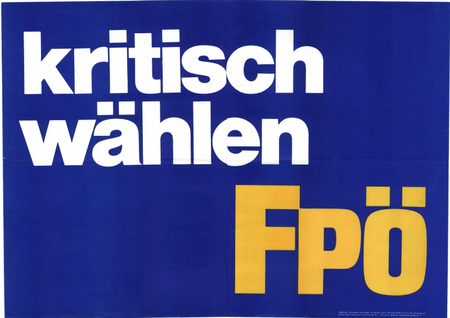
National Council election 1971
At the early elections of 10 October 1971, Friedrich Peter again stood on behalf of the FPÖ. The Freedom Party was able to achieve 5.45 per cent of the vote (+0.07 percentage points) and 10 seats (+4). The reason for the increased number of seats was the preceding electoral system reform, which among other things secured more influence for smaller parties.
Under Bruno Kreisky, the SPÖ succeeded for the first time ever in achieving an absolute majority. The ÖVP suffered corresponding losses.
Brief description of the election campaign
In the autumn of 1971, only approximately one and a half years after the spring 1970 election, the Austrians were again invited to the polls. After about one and a half years of an SPÖ minority government supported by the FPÖ, the Freedom Party was rewarded with a reform of the electoral system, which henceforth also supported small parties and increased the size of the National Council from 165 to 183 seats.
The Freedom Party election campaign was also shaped by this innovation and used slogans such as “Freedom Party votes now have more weight” (“Freiheitlich wählen hat jetzt mehr Gewicht”). The key FPÖ slogan was “Eyes open – vote critically” (Augen auf – kritisch wählen), and with this message, the FPÖ was once again pointing to the control function of the FPÖ, which was of course the sole, albeit small, counterweight to the SPÖ and ÖVP.
Election result
The following parties and electoral lists stood for election at the National Council election of 1971:
Sozialistische Partei Österreichs (SPÖ)
Österreichische Volkspartei (ÖVP)
Freiheitliche Partei Österreichs (FPÖ)
Kommunistische Partei Österreichs (KPÖ)
Offensiv links (OL)
Parties | Votes | Vote share 1971 | ± | Seats 1971 | ± |
SPÖ | 2,280,168 | 50.0% | +1.6% | 93 | +12 |
ÖVP | 1,964,713 | 43.1% | -1.6% | 80 | +2 |
FPÖ | 248,473 | 5.5% | ±0.0% | 10 | +4 |
Government formation
The election outcome marked the beginning of the “Kreisky era”. The first person to obtain an absolute SPÖ majority, Kreisky no longer headed a minority government, but was able to govern as Federal Chancellor of a single-party government.
